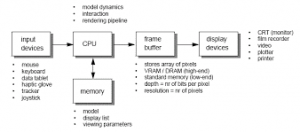Back to: COMPUTER SCIENCE SS1
Welcome to class!
In today’s class, we will be talking about basic functions and uses of computer. Enjoy the class!
Basic Functions and Uses of Computer

Basic functions of a computer
All computers, from the smallest handheld computer to the largest supercomputer, perform the same basic functions with digital information. Those functions are:
Input:
Receiving or accepting information from outside sources. The most common way of performing this function is through the information entered through the keyboard and the click of the mouse. Typing characters at a keyboard, moving the mouse around the screen or speaking to a computer.
Output:
The results of the processing are made available for use by any user or other devices. The most common ways of producing such outputs are through computer monitor, speakers, and printers. When a computer is connected to other devices, including through Internet, this output is in the form of electrical pulses. Displaying characters or pictures on the screen, printing a research paper, or sending an e-mail message.
Processing:
This is the core of computer operation. The computer processes the data that is fed to the computer by various means and the data already contained in internal memory to produce the results that are the core of all computer application. E.g. Calculating the square root of a number, sorting a list of names, or producing a three-dimensional image
Storage:
Store information in the computer. The memory is stored in a computer in several different ways depending on how the information is used. For simplicity, we will classify in two broad categories. First is the memory in the central processing unit of the computer, and the second is the auxiliary memory. The auxiliary memory includes devices such as fixed hard drives. The information stored in the computer can also be divided broadly used in two categories. The user data and the instructions used for internal operation and processing in computing. These instruction are what we call computer programs or software. E.g. Saving your research paper or resume, keeping track of your credit card purchases, or archiving digital pictures of your relatives
Retrieve:
For example, recalling a list of addresses or business contacts

Uses of computer
Computer can be used in all aspects of our everyday lives.
- Education: Getting the right kind of information is a major challenge as is getting information to make sense. Research shows that computers can significantly enhance performance in learning. Students exposed to the internet say they think the web has helped them improve the quality of their academic research and their written work. Lots of academic information are available on the internet.
- Health and Medicine: All medical information and patient records can now be digitized. Software is now able to check the risk of disease through computer usage. Mental health researchers are using computers to screen troubled teenagers in need of psychotherapy.
- Defence: a) Computers are used in helping the military find out where all their assets are (Situational Awareness) and in Communications/Battle Management Systems. b) Computers are used in the logistic and ordering functions of getting equipment to and around the battlefield. c) Computers are used in tanks and planes and ships to target enemy forces, help run the platform and more recently to help diagnose any problems with the platforms. d) Computers help design and test new systems.
- Sports: In today’s technologically growing society, computers are being used in nearly every activity such as recording information, analyzing athlete’s movement, scoreboard etc.
- Government: Various departments of the Government use the computer for their planning, control and law enforcement activities. To name a few – Traffic, Tourism, Information & Broadcasting, Education, Aviation and many others.
Evaluation
- What are the basic functions of a computer?
- List and explain the uses of a computer?
In our next class, we will be talking about BASIC programming Language. We hope you enjoyed the class.
Should you have any further question, feel free to ask in the comment section below and trust us to respond as soon as possible.

what is functions keys
what is functions keys and computer ethics
what is computer ethics